Management Principles, Practices & Career Development Plan
VerifiedAdded on 2024/06/27
|21
|4305
|143
Report
AI Summary
This report provides an overview of management principles and practices, focusing on personal development and career planning. It begins by comparing different management styles, discussing leadership characteristics, evaluating communication processes in businesses like Thomas Cook and TUI Plc, and analyzing organizational culture and change. The report includes a self-assessment using SWOT analysis to review personal strengths, weaknesses, opportunities, and threats as a prospective manager. It outlines objectives and targets for personal development and discusses managerial skills within a business context, emphasizing leading and motivating a team. Furthermore, it presents a career development plan, explaining how managerial and personal skills support career advancement and reviewing development needs to create a comprehensive plan. This resource is available for students on Desklib, offering access to past papers and solved assignments.
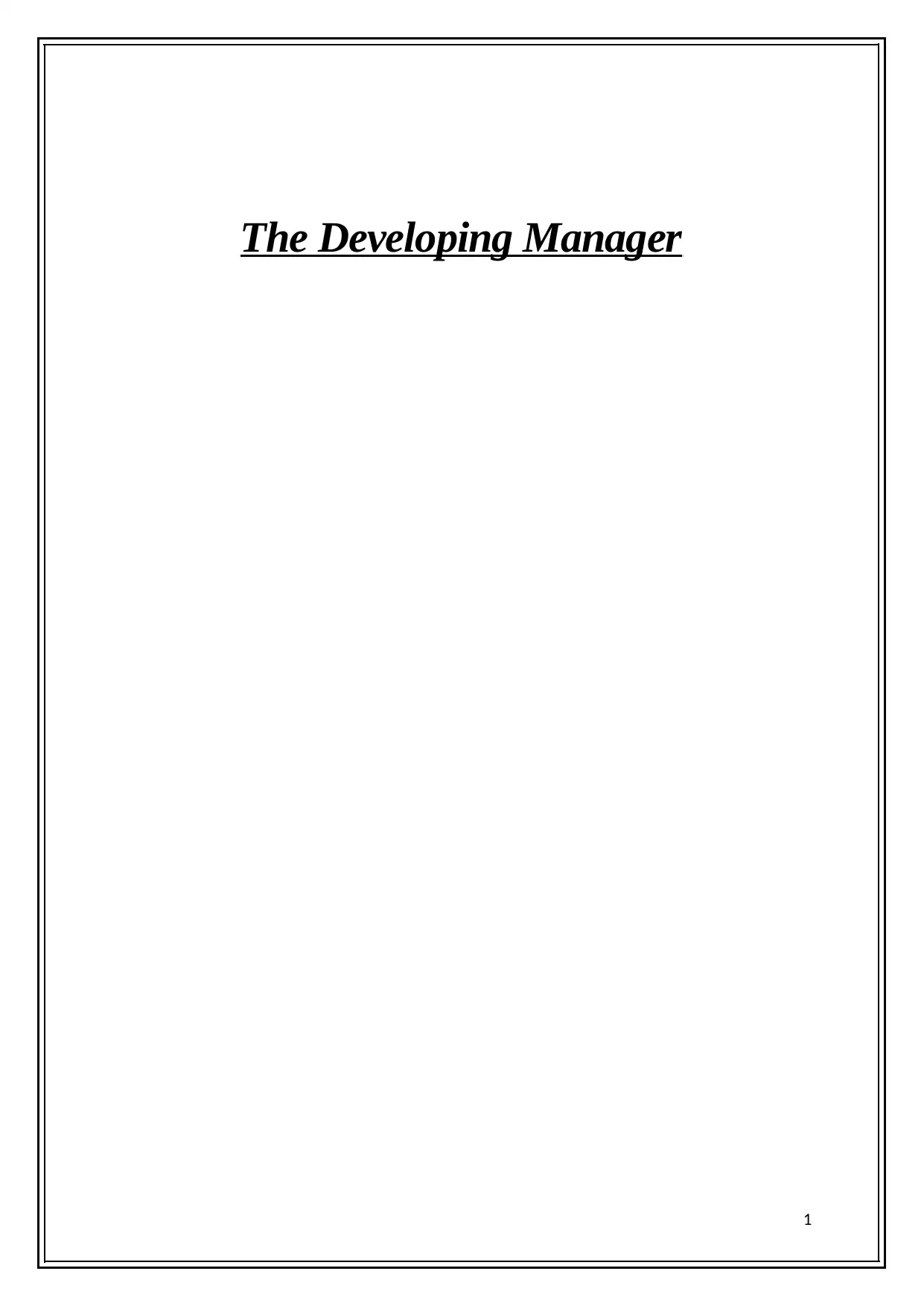
The Developing Manager
1
1
Paraphrase This Document
Need a fresh take? Get an instant paraphrase of this document with our AI Paraphraser
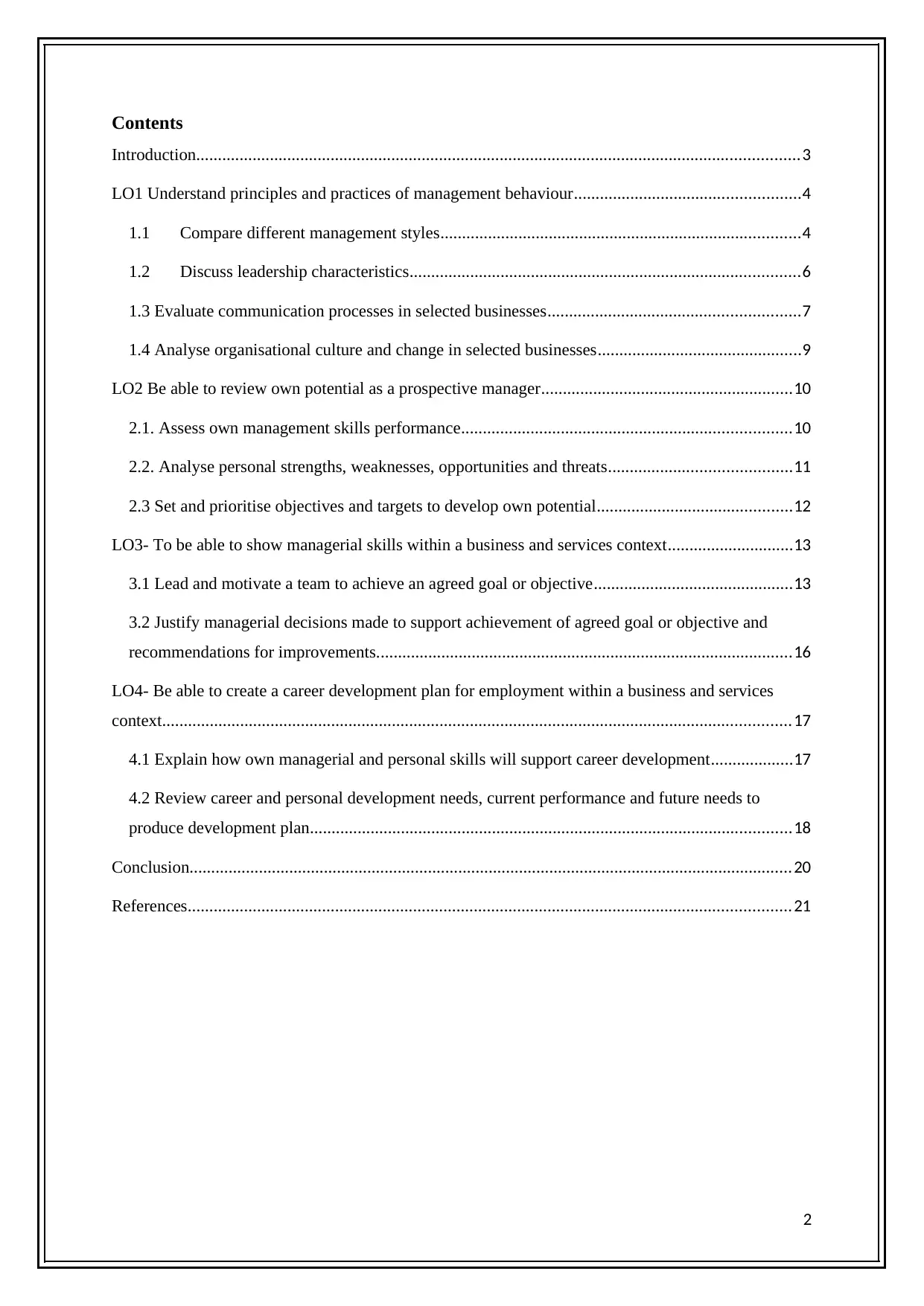
Contents
Introduction...........................................................................................................................................3
LO1 Understand principles and practices of management behaviour....................................................4
1.1 Compare different management styles...................................................................................4
1.2 Discuss leadership characteristics..........................................................................................6
1.3 Evaluate communication processes in selected businesses..........................................................7
1.4 Analyse organisational culture and change in selected businesses...............................................9
LO2 Be able to review own potential as a prospective manager..........................................................10
2.1. Assess own management skills performance............................................................................10
2.2. Analyse personal strengths, weaknesses, opportunities and threats..........................................11
2.3 Set and prioritise objectives and targets to develop own potential.............................................12
LO3- To be able to show managerial skills within a business and services context.............................13
3.1 Lead and motivate a team to achieve an agreed goal or objective..............................................13
3.2 Justify managerial decisions made to support achievement of agreed goal or objective and
recommendations for improvements................................................................................................16
LO4- Be able to create a career development plan for employment within a business and services
context.................................................................................................................................................17
4.1 Explain how own managerial and personal skills will support career development...................17
4.2 Review career and personal development needs, current performance and future needs to
produce development plan...............................................................................................................18
Conclusion...........................................................................................................................................20
References...........................................................................................................................................21
2
Introduction...........................................................................................................................................3
LO1 Understand principles and practices of management behaviour....................................................4
1.1 Compare different management styles...................................................................................4
1.2 Discuss leadership characteristics..........................................................................................6
1.3 Evaluate communication processes in selected businesses..........................................................7
1.4 Analyse organisational culture and change in selected businesses...............................................9
LO2 Be able to review own potential as a prospective manager..........................................................10
2.1. Assess own management skills performance............................................................................10
2.2. Analyse personal strengths, weaknesses, opportunities and threats..........................................11
2.3 Set and prioritise objectives and targets to develop own potential.............................................12
LO3- To be able to show managerial skills within a business and services context.............................13
3.1 Lead and motivate a team to achieve an agreed goal or objective..............................................13
3.2 Justify managerial decisions made to support achievement of agreed goal or objective and
recommendations for improvements................................................................................................16
LO4- Be able to create a career development plan for employment within a business and services
context.................................................................................................................................................17
4.1 Explain how own managerial and personal skills will support career development...................17
4.2 Review career and personal development needs, current performance and future needs to
produce development plan...............................................................................................................18
Conclusion...........................................................................................................................................20
References...........................................................................................................................................21
2
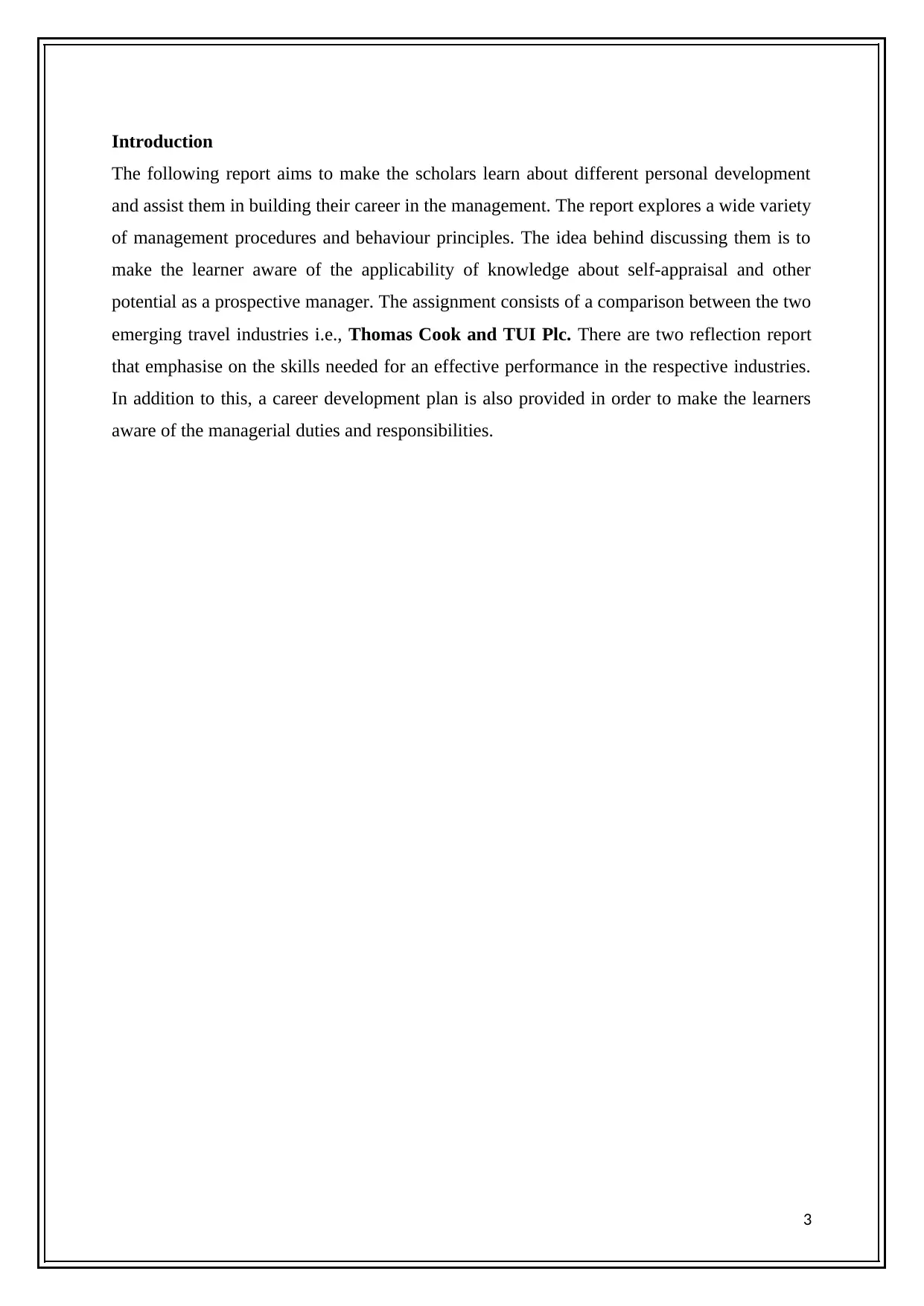
Introduction
The following report aims to make the scholars learn about different personal development
and assist them in building their career in the management. The report explores a wide variety
of management procedures and behaviour principles. The idea behind discussing them is to
make the learner aware of the applicability of knowledge about self-appraisal and other
potential as a prospective manager. The assignment consists of a comparison between the two
emerging travel industries i.e., Thomas Cook and TUI Plc. There are two reflection report
that emphasise on the skills needed for an effective performance in the respective industries.
In addition to this, a career development plan is also provided in order to make the learners
aware of the managerial duties and responsibilities.
3
The following report aims to make the scholars learn about different personal development
and assist them in building their career in the management. The report explores a wide variety
of management procedures and behaviour principles. The idea behind discussing them is to
make the learner aware of the applicability of knowledge about self-appraisal and other
potential as a prospective manager. The assignment consists of a comparison between the two
emerging travel industries i.e., Thomas Cook and TUI Plc. There are two reflection report
that emphasise on the skills needed for an effective performance in the respective industries.
In addition to this, a career development plan is also provided in order to make the learners
aware of the managerial duties and responsibilities.
3
⊘ This is a preview!⊘
Do you want full access?
Subscribe today to unlock all pages.

Trusted by 1+ million students worldwide
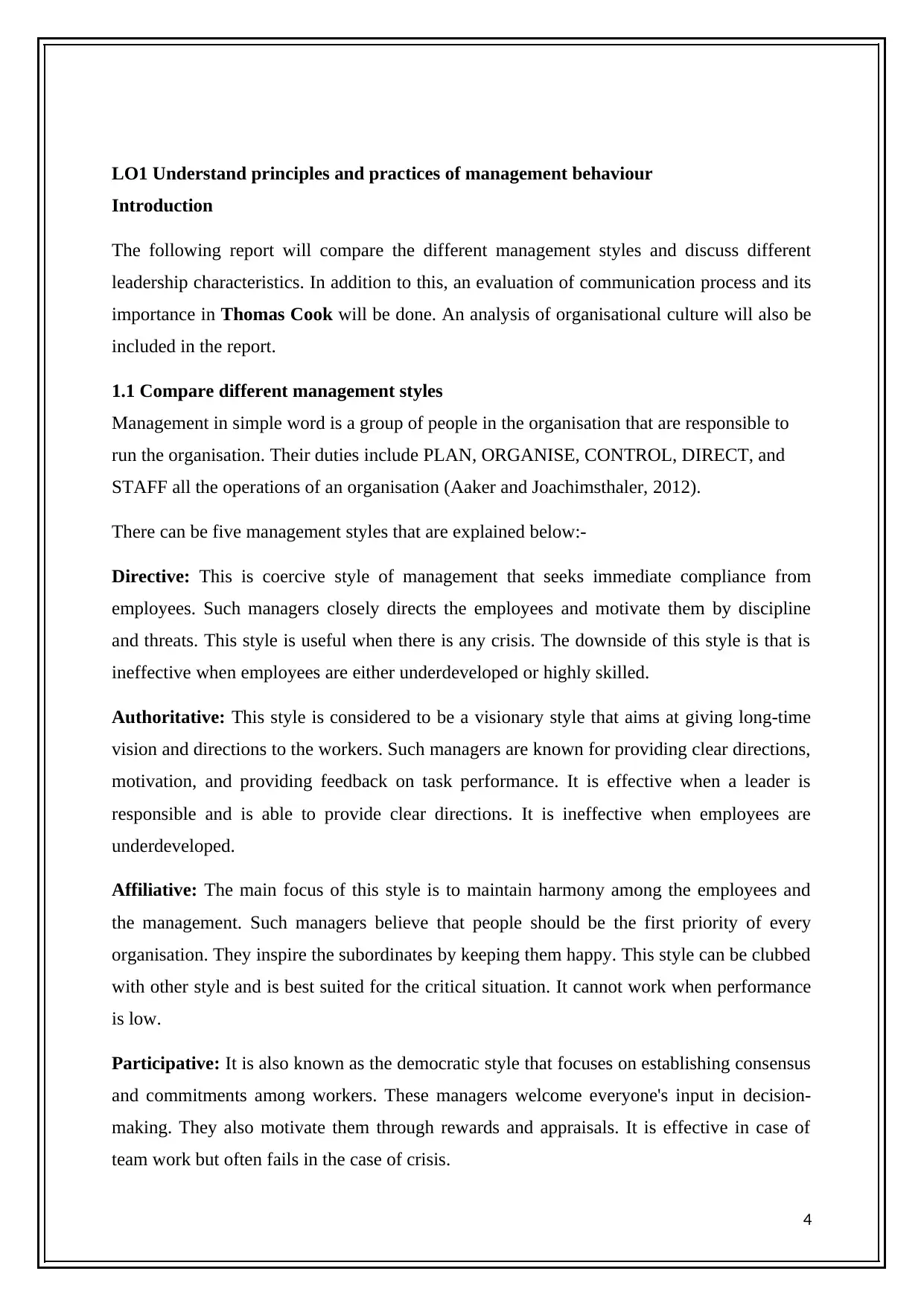
LO1 Understand principles and practices of management behaviour
Introduction
The following report will compare the different management styles and discuss different
leadership characteristics. In addition to this, an evaluation of communication process and its
importance in Thomas Cook will be done. An analysis of organisational culture will also be
included in the report.
1.1 Compare different management styles
Management in simple word is a group of people in the organisation that are responsible to
run the organisation. Their duties include PLAN, ORGANISE, CONTROL, DIRECT, and
STAFF all the operations of an organisation (Aaker and Joachimsthaler, 2012).
There can be five management styles that are explained below:-
Directive: This is coercive style of management that seeks immediate compliance from
employees. Such managers closely directs the employees and motivate them by discipline
and threats. This style is useful when there is any crisis. The downside of this style is that is
ineffective when employees are either underdeveloped or highly skilled.
Authoritative: This style is considered to be a visionary style that aims at giving long-time
vision and directions to the workers. Such managers are known for providing clear directions,
motivation, and providing feedback on task performance. It is effective when a leader is
responsible and is able to provide clear directions. It is ineffective when employees are
underdeveloped.
Affiliative: The main focus of this style is to maintain harmony among the employees and
the management. Such managers believe that people should be the first priority of every
organisation. They inspire the subordinates by keeping them happy. This style can be clubbed
with other style and is best suited for the critical situation. It cannot work when performance
is low.
Participative: It is also known as the democratic style that focuses on establishing consensus
and commitments among workers. These managers welcome everyone's input in decision-
making. They also motivate them through rewards and appraisals. It is effective in case of
team work but often fails in the case of crisis.
4
Introduction
The following report will compare the different management styles and discuss different
leadership characteristics. In addition to this, an evaluation of communication process and its
importance in Thomas Cook will be done. An analysis of organisational culture will also be
included in the report.
1.1 Compare different management styles
Management in simple word is a group of people in the organisation that are responsible to
run the organisation. Their duties include PLAN, ORGANISE, CONTROL, DIRECT, and
STAFF all the operations of an organisation (Aaker and Joachimsthaler, 2012).
There can be five management styles that are explained below:-
Directive: This is coercive style of management that seeks immediate compliance from
employees. Such managers closely directs the employees and motivate them by discipline
and threats. This style is useful when there is any crisis. The downside of this style is that is
ineffective when employees are either underdeveloped or highly skilled.
Authoritative: This style is considered to be a visionary style that aims at giving long-time
vision and directions to the workers. Such managers are known for providing clear directions,
motivation, and providing feedback on task performance. It is effective when a leader is
responsible and is able to provide clear directions. It is ineffective when employees are
underdeveloped.
Affiliative: The main focus of this style is to maintain harmony among the employees and
the management. Such managers believe that people should be the first priority of every
organisation. They inspire the subordinates by keeping them happy. This style can be clubbed
with other style and is best suited for the critical situation. It cannot work when performance
is low.
Participative: It is also known as the democratic style that focuses on establishing consensus
and commitments among workers. These managers welcome everyone's input in decision-
making. They also motivate them through rewards and appraisals. It is effective in case of
team work but often fails in the case of crisis.
4
Paraphrase This Document
Need a fresh take? Get an instant paraphrase of this document with our AI Paraphraser
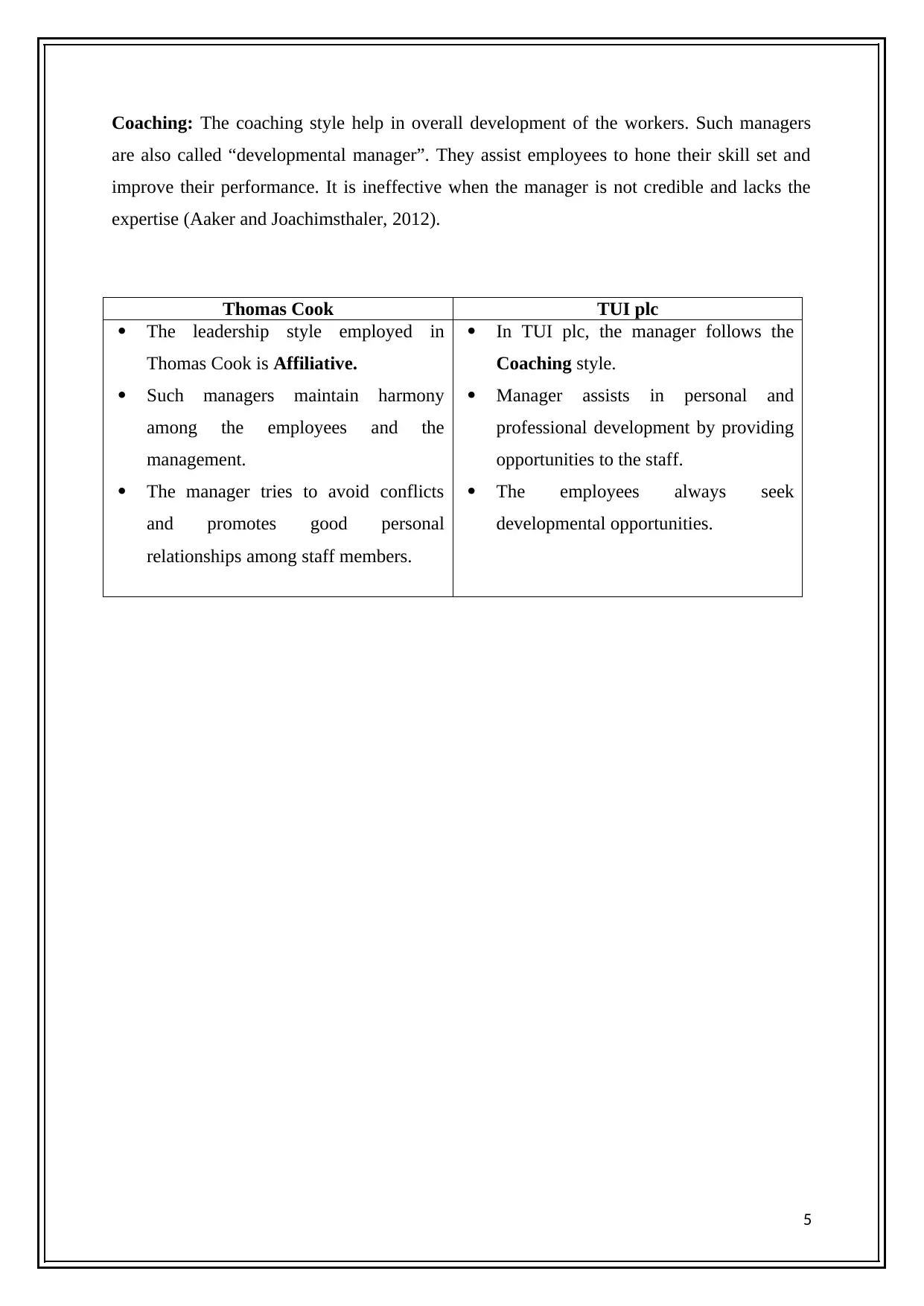
Coaching: The coaching style help in overall development of the workers. Such managers
are also called “developmental manager”. They assist employees to hone their skill set and
improve their performance. It is ineffective when the manager is not credible and lacks the
expertise (Aaker and Joachimsthaler, 2012).
Thomas Cook TUI plc
The leadership style employed in
Thomas Cook is Affiliative.
Such managers maintain harmony
among the employees and the
management.
The manager tries to avoid conflicts
and promotes good personal
relationships among staff members.
In TUI plc, the manager follows the
Coaching style.
Manager assists in personal and
professional development by providing
opportunities to the staff.
The employees always seek
developmental opportunities.
5
are also called “developmental manager”. They assist employees to hone their skill set and
improve their performance. It is ineffective when the manager is not credible and lacks the
expertise (Aaker and Joachimsthaler, 2012).
Thomas Cook TUI plc
The leadership style employed in
Thomas Cook is Affiliative.
Such managers maintain harmony
among the employees and the
management.
The manager tries to avoid conflicts
and promotes good personal
relationships among staff members.
In TUI plc, the manager follows the
Coaching style.
Manager assists in personal and
professional development by providing
opportunities to the staff.
The employees always seek
developmental opportunities.
5
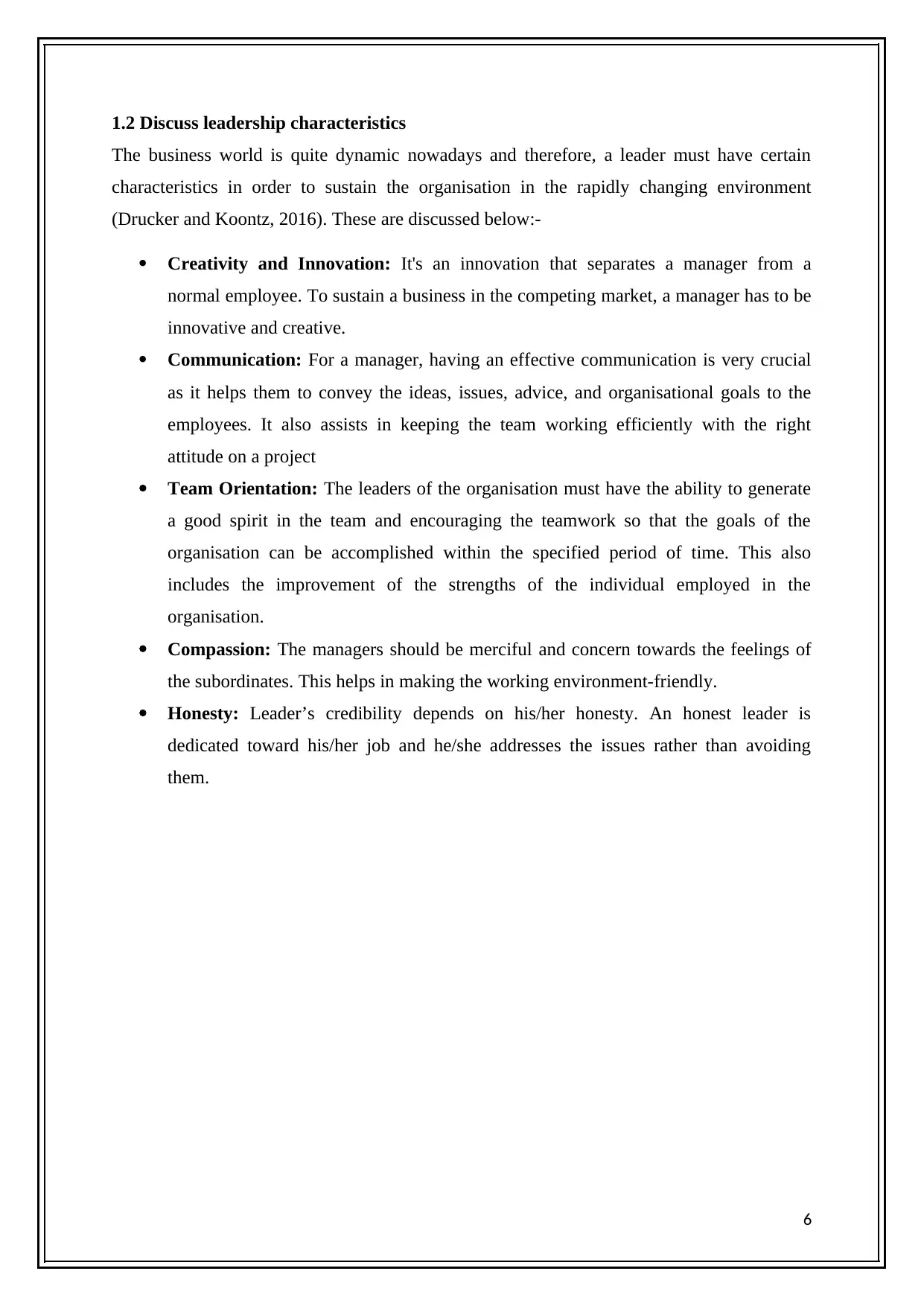
1.2 Discuss leadership characteristics
The business world is quite dynamic nowadays and therefore, a leader must have certain
characteristics in order to sustain the organisation in the rapidly changing environment
(Drucker and Koontz, 2016). These are discussed below:-
Creativity and Innovation: It's an innovation that separates a manager from a
normal employee. To sustain a business in the competing market, a manager has to be
innovative and creative.
Communication: For a manager, having an effective communication is very crucial
as it helps them to convey the ideas, issues, advice, and organisational goals to the
employees. It also assists in keeping the team working efficiently with the right
attitude on a project
Team Orientation: The leaders of the organisation must have the ability to generate
a good spirit in the team and encouraging the teamwork so that the goals of the
organisation can be accomplished within the specified period of time. This also
includes the improvement of the strengths of the individual employed in the
organisation.
Compassion: The managers should be merciful and concern towards the feelings of
the subordinates. This helps in making the working environment-friendly.
Honesty: Leader’s credibility depends on his/her honesty. An honest leader is
dedicated toward his/her job and he/she addresses the issues rather than avoiding
them.
6
The business world is quite dynamic nowadays and therefore, a leader must have certain
characteristics in order to sustain the organisation in the rapidly changing environment
(Drucker and Koontz, 2016). These are discussed below:-
Creativity and Innovation: It's an innovation that separates a manager from a
normal employee. To sustain a business in the competing market, a manager has to be
innovative and creative.
Communication: For a manager, having an effective communication is very crucial
as it helps them to convey the ideas, issues, advice, and organisational goals to the
employees. It also assists in keeping the team working efficiently with the right
attitude on a project
Team Orientation: The leaders of the organisation must have the ability to generate
a good spirit in the team and encouraging the teamwork so that the goals of the
organisation can be accomplished within the specified period of time. This also
includes the improvement of the strengths of the individual employed in the
organisation.
Compassion: The managers should be merciful and concern towards the feelings of
the subordinates. This helps in making the working environment-friendly.
Honesty: Leader’s credibility depends on his/her honesty. An honest leader is
dedicated toward his/her job and he/she addresses the issues rather than avoiding
them.
6
⊘ This is a preview!⊘
Do you want full access?
Subscribe today to unlock all pages.

Trusted by 1+ million students worldwide
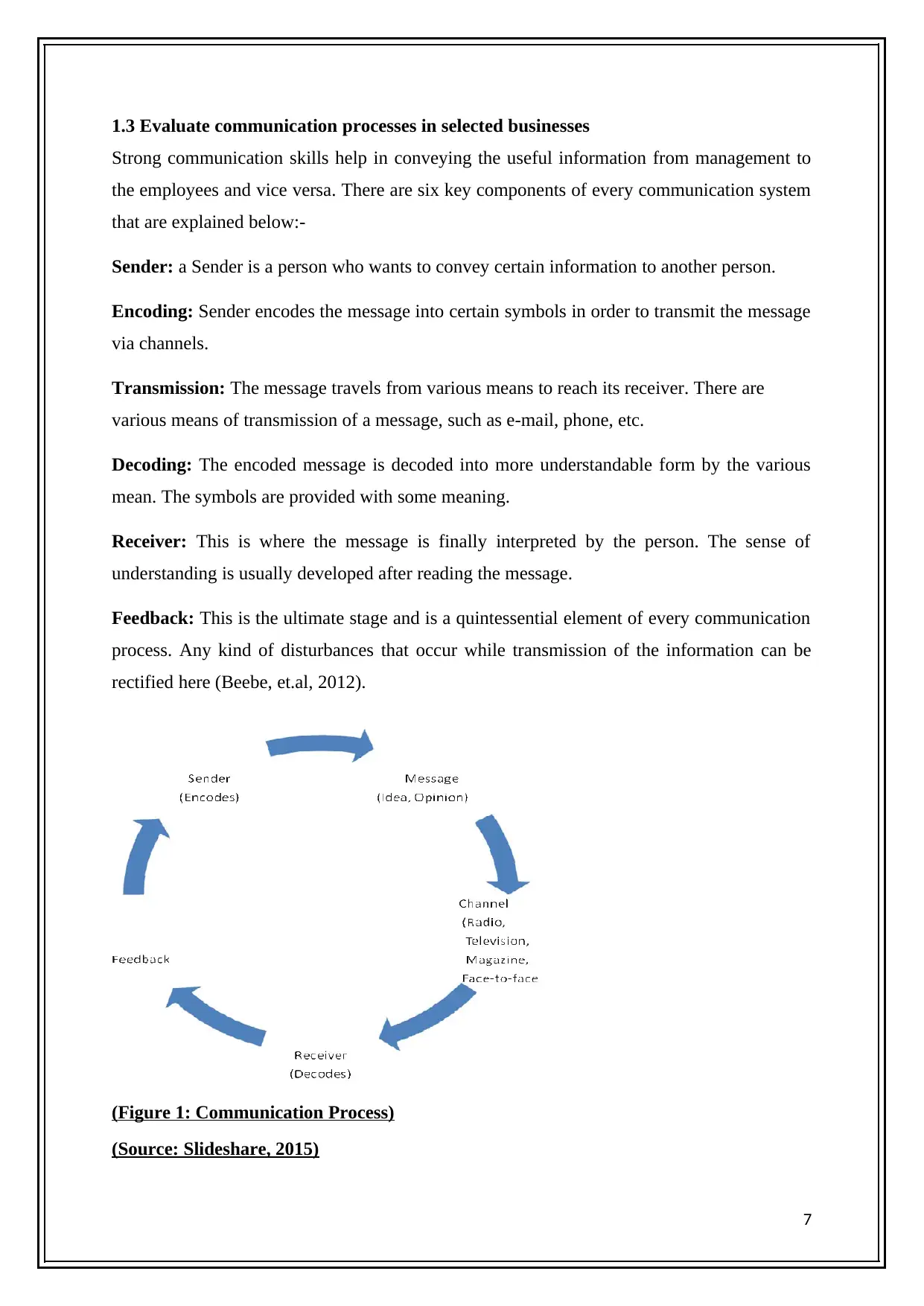
1.3 Evaluate communication processes in selected businesses
Strong communication skills help in conveying the useful information from management to
the employees and vice versa. There are six key components of every communication system
that are explained below:-
Sender: a Sender is a person who wants to convey certain information to another person.
Encoding: Sender encodes the message into certain symbols in order to transmit the message
via channels.
Transmission: The message travels from various means to reach its receiver. There are
various means of transmission of a message, such as e-mail, phone, etc.
Decoding: The encoded message is decoded into more understandable form by the various
mean. The symbols are provided with some meaning.
Receiver: This is where the message is finally interpreted by the person. The sense of
understanding is usually developed after reading the message.
Feedback: This is the ultimate stage and is a quintessential element of every communication
process. Any kind of disturbances that occur while transmission of the information can be
rectified here (Beebe, et.al, 2012).
(Figure 1: Communication Process)
(Source: Slideshare, 2015)
7
Strong communication skills help in conveying the useful information from management to
the employees and vice versa. There are six key components of every communication system
that are explained below:-
Sender: a Sender is a person who wants to convey certain information to another person.
Encoding: Sender encodes the message into certain symbols in order to transmit the message
via channels.
Transmission: The message travels from various means to reach its receiver. There are
various means of transmission of a message, such as e-mail, phone, etc.
Decoding: The encoded message is decoded into more understandable form by the various
mean. The symbols are provided with some meaning.
Receiver: This is where the message is finally interpreted by the person. The sense of
understanding is usually developed after reading the message.
Feedback: This is the ultimate stage and is a quintessential element of every communication
process. Any kind of disturbances that occur while transmission of the information can be
rectified here (Beebe, et.al, 2012).
(Figure 1: Communication Process)
(Source: Slideshare, 2015)
7
Paraphrase This Document
Need a fresh take? Get an instant paraphrase of this document with our AI Paraphraser
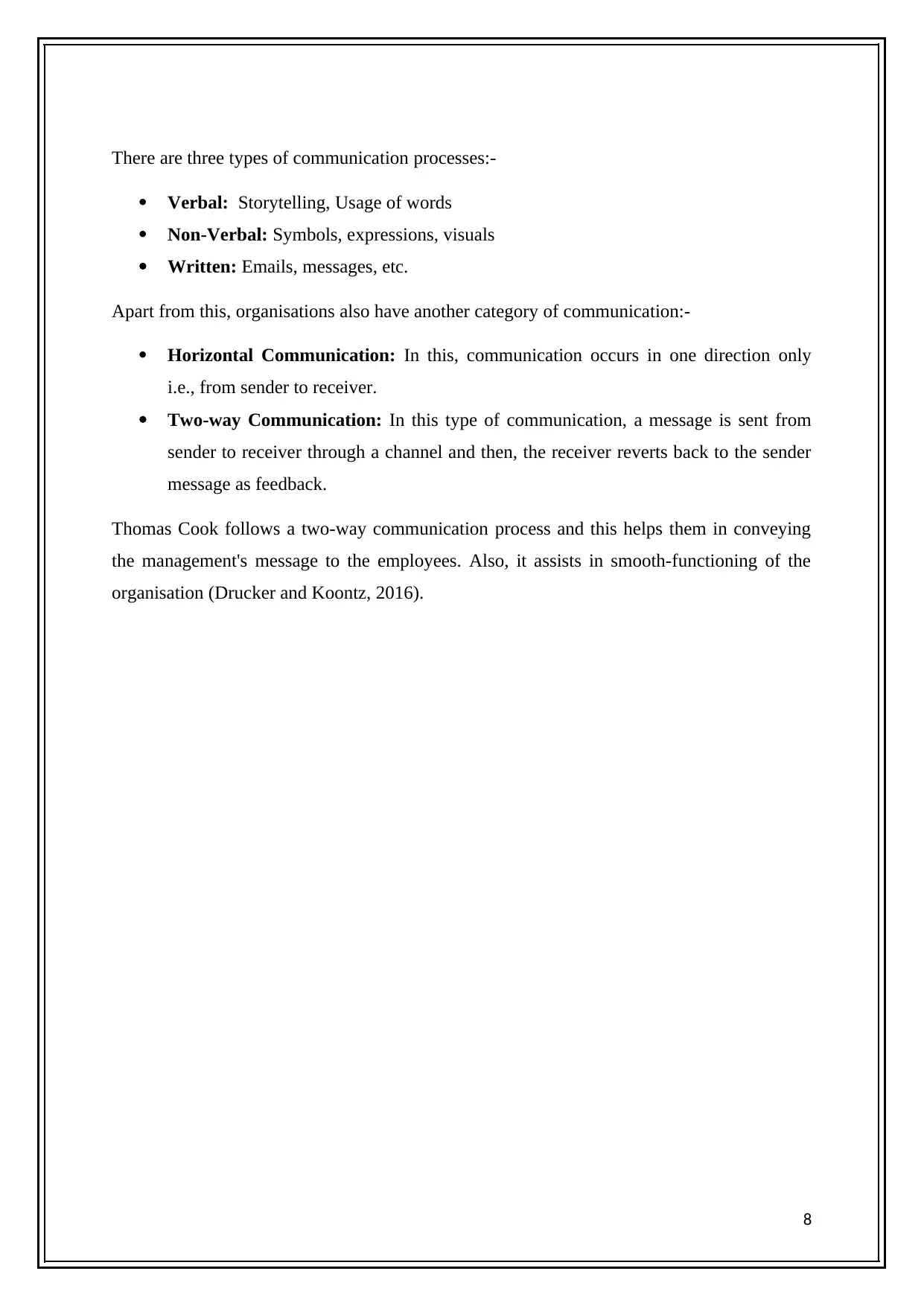
There are three types of communication processes:-
Verbal: Storytelling, Usage of words
Non-Verbal: Symbols, expressions, visuals
Written: Emails, messages, etc.
Apart from this, organisations also have another category of communication:-
Horizontal Communication: In this, communication occurs in one direction only
i.e., from sender to receiver.
Two-way Communication: In this type of communication, a message is sent from
sender to receiver through a channel and then, the receiver reverts back to the sender
message as feedback.
Thomas Cook follows a two-way communication process and this helps them in conveying
the management's message to the employees. Also, it assists in smooth-functioning of the
organisation (Drucker and Koontz, 2016).
8
Verbal: Storytelling, Usage of words
Non-Verbal: Symbols, expressions, visuals
Written: Emails, messages, etc.
Apart from this, organisations also have another category of communication:-
Horizontal Communication: In this, communication occurs in one direction only
i.e., from sender to receiver.
Two-way Communication: In this type of communication, a message is sent from
sender to receiver through a channel and then, the receiver reverts back to the sender
message as feedback.
Thomas Cook follows a two-way communication process and this helps them in conveying
the management's message to the employees. Also, it assists in smooth-functioning of the
organisation (Drucker and Koontz, 2016).
8
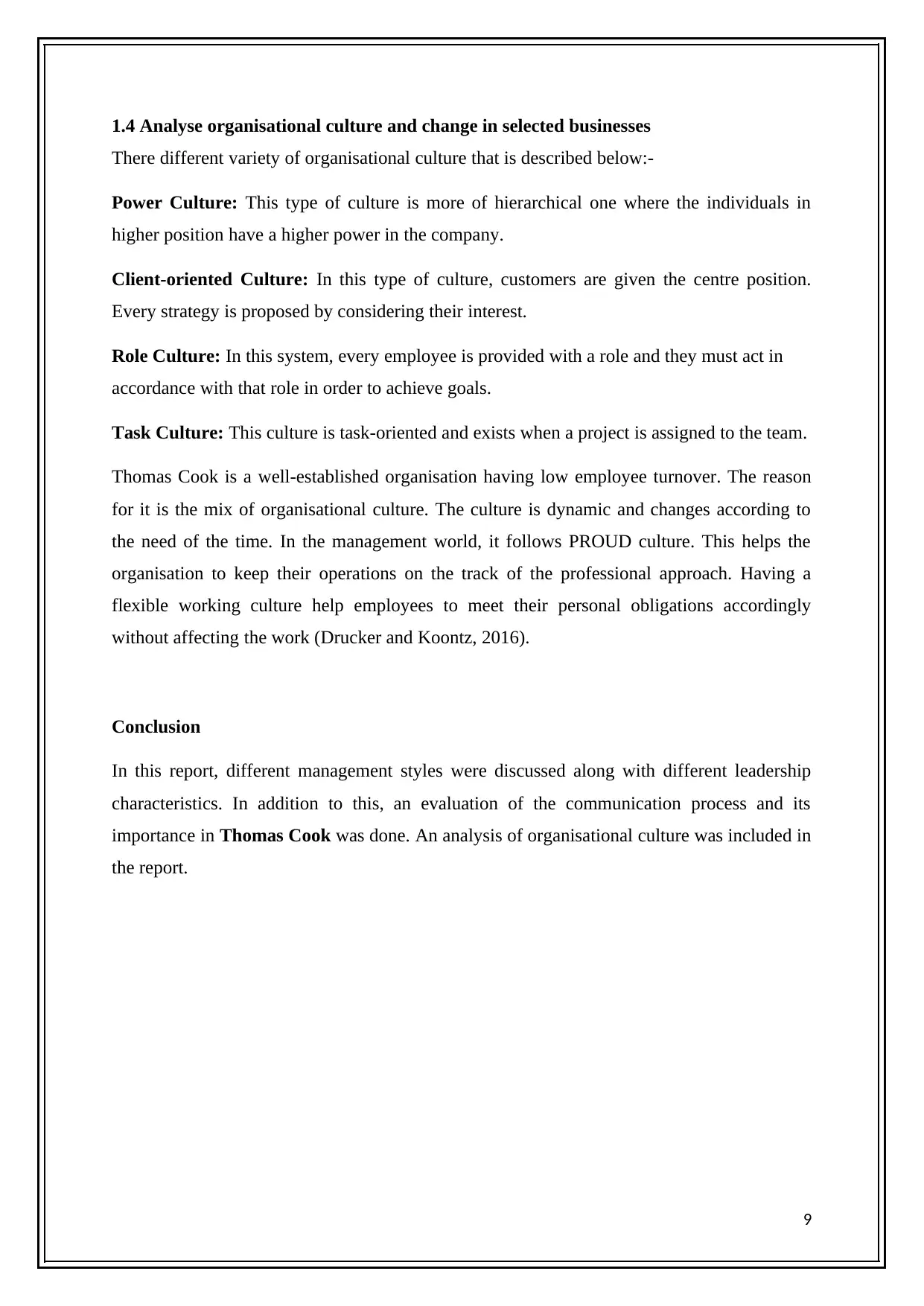
1.4 Analyse organisational culture and change in selected businesses
There different variety of organisational culture that is described below:-
Power Culture: This type of culture is more of hierarchical one where the individuals in
higher position have a higher power in the company.
Client-oriented Culture: In this type of culture, customers are given the centre position.
Every strategy is proposed by considering their interest.
Role Culture: In this system, every employee is provided with a role and they must act in
accordance with that role in order to achieve goals.
Task Culture: This culture is task-oriented and exists when a project is assigned to the team.
Thomas Cook is a well-established organisation having low employee turnover. The reason
for it is the mix of organisational culture. The culture is dynamic and changes according to
the need of the time. In the management world, it follows PROUD culture. This helps the
organisation to keep their operations on the track of the professional approach. Having a
flexible working culture help employees to meet their personal obligations accordingly
without affecting the work (Drucker and Koontz, 2016).
Conclusion
In this report, different management styles were discussed along with different leadership
characteristics. In addition to this, an evaluation of the communication process and its
importance in Thomas Cook was done. An analysis of organisational culture was included in
the report.
9
There different variety of organisational culture that is described below:-
Power Culture: This type of culture is more of hierarchical one where the individuals in
higher position have a higher power in the company.
Client-oriented Culture: In this type of culture, customers are given the centre position.
Every strategy is proposed by considering their interest.
Role Culture: In this system, every employee is provided with a role and they must act in
accordance with that role in order to achieve goals.
Task Culture: This culture is task-oriented and exists when a project is assigned to the team.
Thomas Cook is a well-established organisation having low employee turnover. The reason
for it is the mix of organisational culture. The culture is dynamic and changes according to
the need of the time. In the management world, it follows PROUD culture. This helps the
organisation to keep their operations on the track of the professional approach. Having a
flexible working culture help employees to meet their personal obligations accordingly
without affecting the work (Drucker and Koontz, 2016).
Conclusion
In this report, different management styles were discussed along with different leadership
characteristics. In addition to this, an evaluation of the communication process and its
importance in Thomas Cook was done. An analysis of organisational culture was included in
the report.
9
⊘ This is a preview!⊘
Do you want full access?
Subscribe today to unlock all pages.

Trusted by 1+ million students worldwide
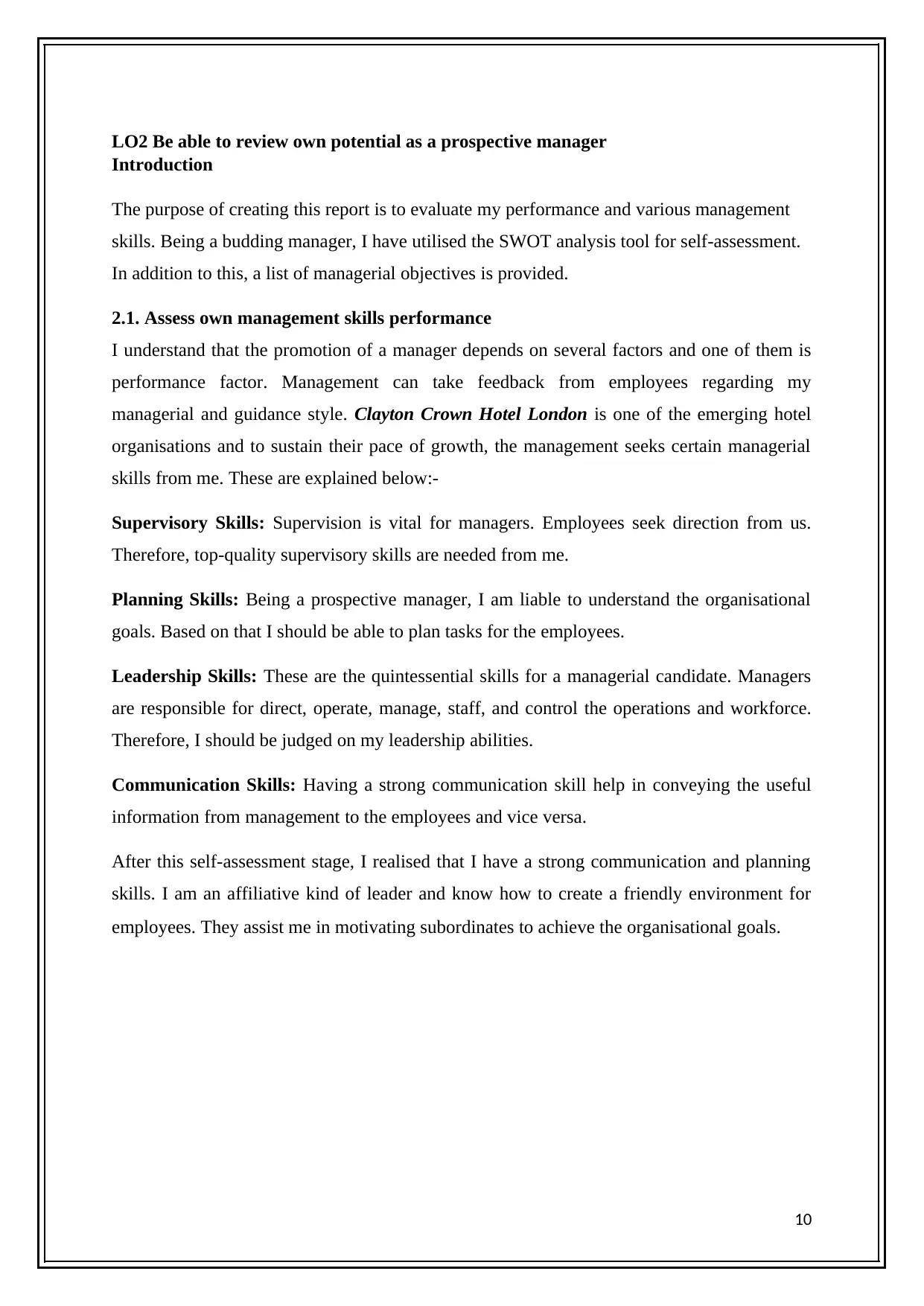
LO2 Be able to review own potential as a prospective manager
Introduction
The purpose of creating this report is to evaluate my performance and various management
skills. Being a budding manager, I have utilised the SWOT analysis tool for self-assessment.
In addition to this, a list of managerial objectives is provided.
2.1. Assess own management skills performance
I understand that the promotion of a manager depends on several factors and one of them is
performance factor. Management can take feedback from employees regarding my
managerial and guidance style. Clayton Crown Hotel London is one of the emerging hotel
organisations and to sustain their pace of growth, the management seeks certain managerial
skills from me. These are explained below:-
Supervisory Skills: Supervision is vital for managers. Employees seek direction from us.
Therefore, top-quality supervisory skills are needed from me.
Planning Skills: Being a prospective manager, I am liable to understand the organisational
goals. Based on that I should be able to plan tasks for the employees.
Leadership Skills: These are the quintessential skills for a managerial candidate. Managers
are responsible for direct, operate, manage, staff, and control the operations and workforce.
Therefore, I should be judged on my leadership abilities.
Communication Skills: Having a strong communication skill help in conveying the useful
information from management to the employees and vice versa.
After this self-assessment stage, I realised that I have a strong communication and planning
skills. I am an affiliative kind of leader and know how to create a friendly environment for
employees. They assist me in motivating subordinates to achieve the organisational goals.
10
Introduction
The purpose of creating this report is to evaluate my performance and various management
skills. Being a budding manager, I have utilised the SWOT analysis tool for self-assessment.
In addition to this, a list of managerial objectives is provided.
2.1. Assess own management skills performance
I understand that the promotion of a manager depends on several factors and one of them is
performance factor. Management can take feedback from employees regarding my
managerial and guidance style. Clayton Crown Hotel London is one of the emerging hotel
organisations and to sustain their pace of growth, the management seeks certain managerial
skills from me. These are explained below:-
Supervisory Skills: Supervision is vital for managers. Employees seek direction from us.
Therefore, top-quality supervisory skills are needed from me.
Planning Skills: Being a prospective manager, I am liable to understand the organisational
goals. Based on that I should be able to plan tasks for the employees.
Leadership Skills: These are the quintessential skills for a managerial candidate. Managers
are responsible for direct, operate, manage, staff, and control the operations and workforce.
Therefore, I should be judged on my leadership abilities.
Communication Skills: Having a strong communication skill help in conveying the useful
information from management to the employees and vice versa.
After this self-assessment stage, I realised that I have a strong communication and planning
skills. I am an affiliative kind of leader and know how to create a friendly environment for
employees. They assist me in motivating subordinates to achieve the organisational goals.
10
Paraphrase This Document
Need a fresh take? Get an instant paraphrase of this document with our AI Paraphraser
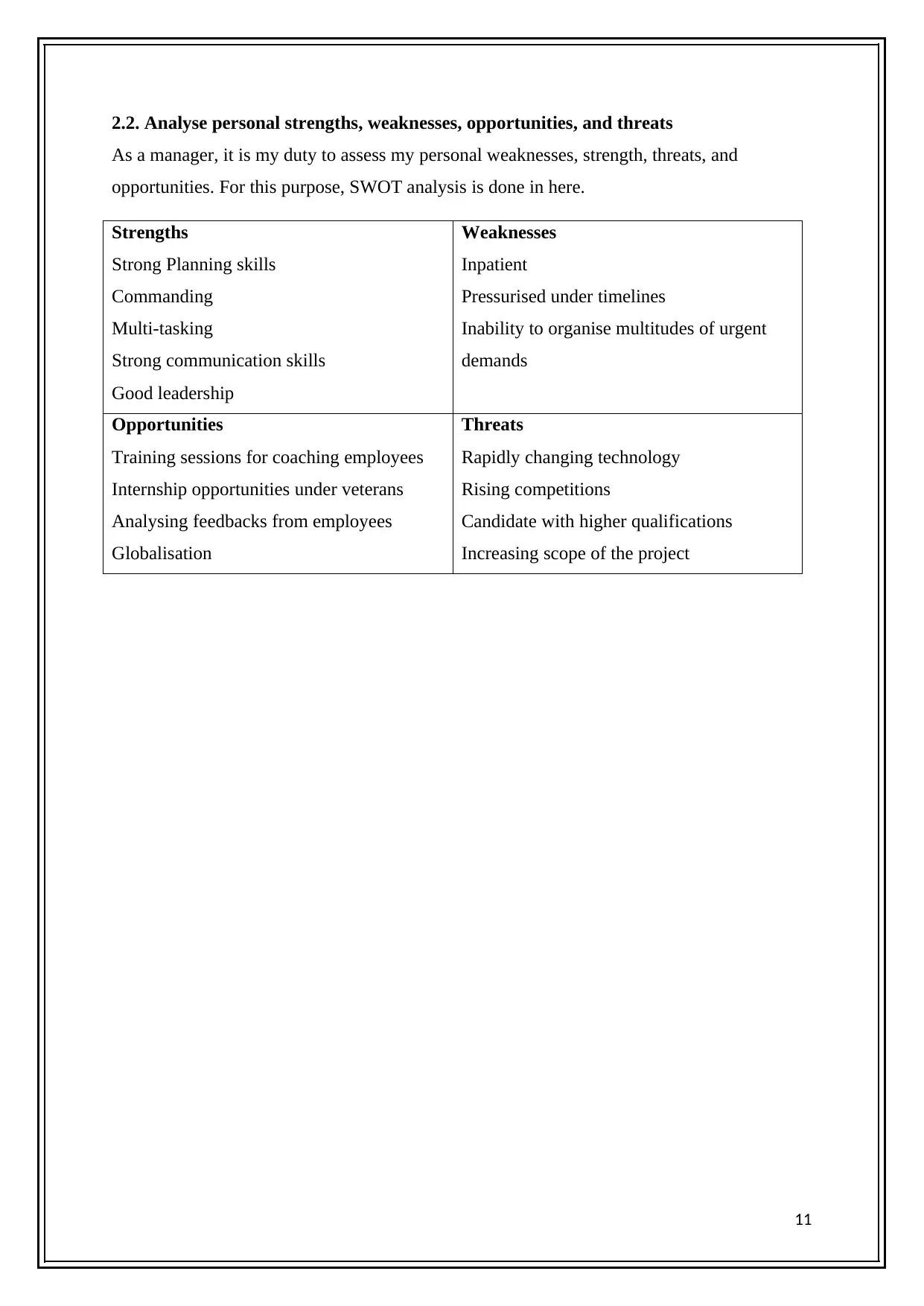
2.2. Analyse personal strengths, weaknesses, opportunities, and threats
As a manager, it is my duty to assess my personal weaknesses, strength, threats, and
opportunities. For this purpose, SWOT analysis is done in here.
Strengths
Strong Planning skills
Commanding
Multi-tasking
Strong communication skills
Good leadership
Weaknesses
Inpatient
Pressurised under timelines
Inability to organise multitudes of urgent
demands
Opportunities
Training sessions for coaching employees
Internship opportunities under veterans
Analysing feedbacks from employees
Globalisation
Threats
Rapidly changing technology
Rising competitions
Candidate with higher qualifications
Increasing scope of the project
11
As a manager, it is my duty to assess my personal weaknesses, strength, threats, and
opportunities. For this purpose, SWOT analysis is done in here.
Strengths
Strong Planning skills
Commanding
Multi-tasking
Strong communication skills
Good leadership
Weaknesses
Inpatient
Pressurised under timelines
Inability to organise multitudes of urgent
demands
Opportunities
Training sessions for coaching employees
Internship opportunities under veterans
Analysing feedbacks from employees
Globalisation
Threats
Rapidly changing technology
Rising competitions
Candidate with higher qualifications
Increasing scope of the project
11
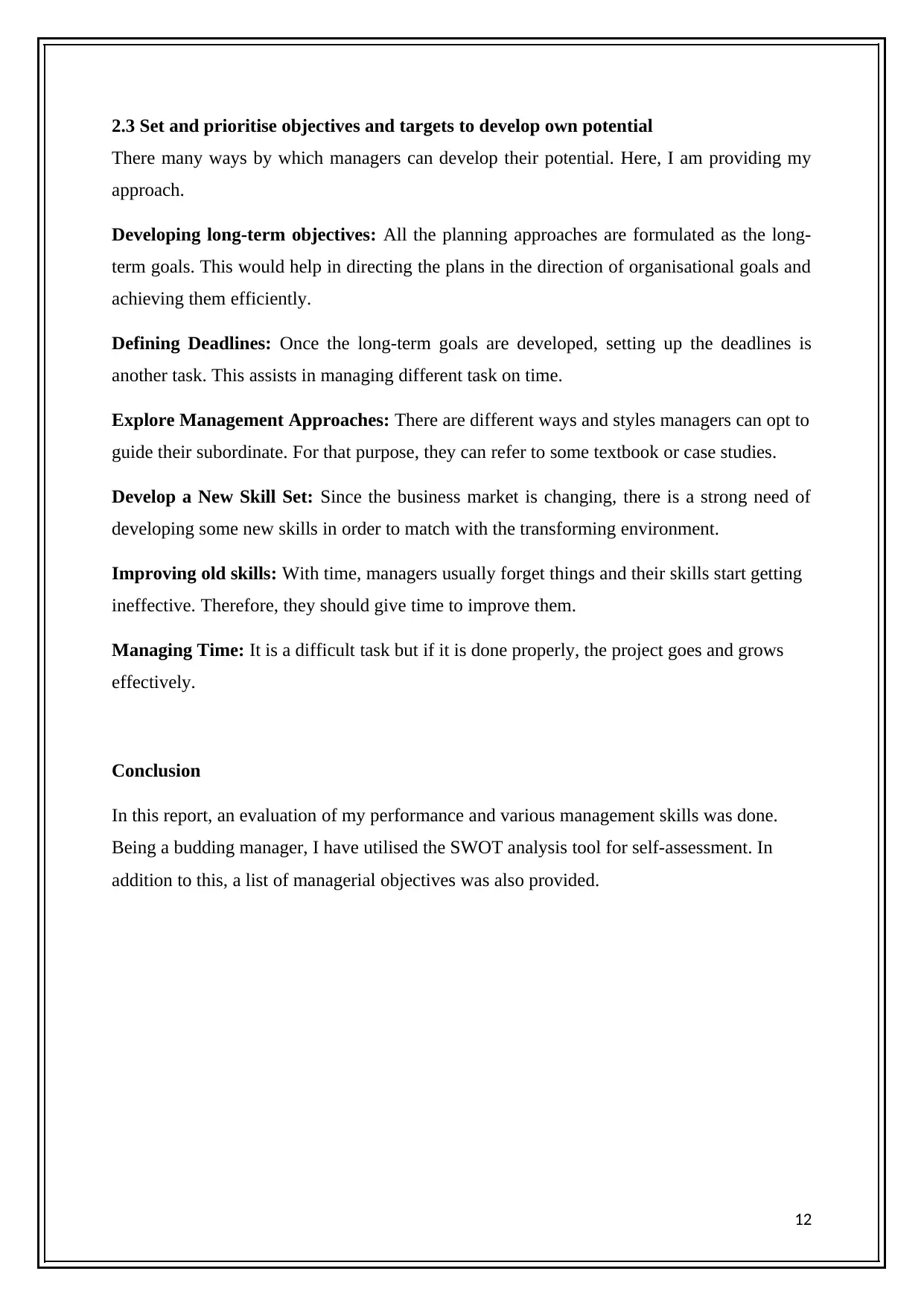
2.3 Set and prioritise objectives and targets to develop own potential
There many ways by which managers can develop their potential. Here, I am providing my
approach.
Developing long-term objectives: All the planning approaches are formulated as the long-
term goals. This would help in directing the plans in the direction of organisational goals and
achieving them efficiently.
Defining Deadlines: Once the long-term goals are developed, setting up the deadlines is
another task. This assists in managing different task on time.
Explore Management Approaches: There are different ways and styles managers can opt to
guide their subordinate. For that purpose, they can refer to some textbook or case studies.
Develop a New Skill Set: Since the business market is changing, there is a strong need of
developing some new skills in order to match with the transforming environment.
Improving old skills: With time, managers usually forget things and their skills start getting
ineffective. Therefore, they should give time to improve them.
Managing Time: It is a difficult task but if it is done properly, the project goes and grows
effectively.
Conclusion
In this report, an evaluation of my performance and various management skills was done.
Being a budding manager, I have utilised the SWOT analysis tool for self-assessment. In
addition to this, a list of managerial objectives was also provided.
12
There many ways by which managers can develop their potential. Here, I am providing my
approach.
Developing long-term objectives: All the planning approaches are formulated as the long-
term goals. This would help in directing the plans in the direction of organisational goals and
achieving them efficiently.
Defining Deadlines: Once the long-term goals are developed, setting up the deadlines is
another task. This assists in managing different task on time.
Explore Management Approaches: There are different ways and styles managers can opt to
guide their subordinate. For that purpose, they can refer to some textbook or case studies.
Develop a New Skill Set: Since the business market is changing, there is a strong need of
developing some new skills in order to match with the transforming environment.
Improving old skills: With time, managers usually forget things and their skills start getting
ineffective. Therefore, they should give time to improve them.
Managing Time: It is a difficult task but if it is done properly, the project goes and grows
effectively.
Conclusion
In this report, an evaluation of my performance and various management skills was done.
Being a budding manager, I have utilised the SWOT analysis tool for self-assessment. In
addition to this, a list of managerial objectives was also provided.
12
⊘ This is a preview!⊘
Do you want full access?
Subscribe today to unlock all pages.

Trusted by 1+ million students worldwide
1 out of 21
Related Documents
Your All-in-One AI-Powered Toolkit for Academic Success.
+13062052269
info@desklib.com
Available 24*7 on WhatsApp / Email
![[object Object]](/_next/static/media/star-bottom.7253800d.svg)
Unlock your academic potential
Copyright © 2020–2026 A2Z Services. All Rights Reserved. Developed and managed by ZUCOL.




